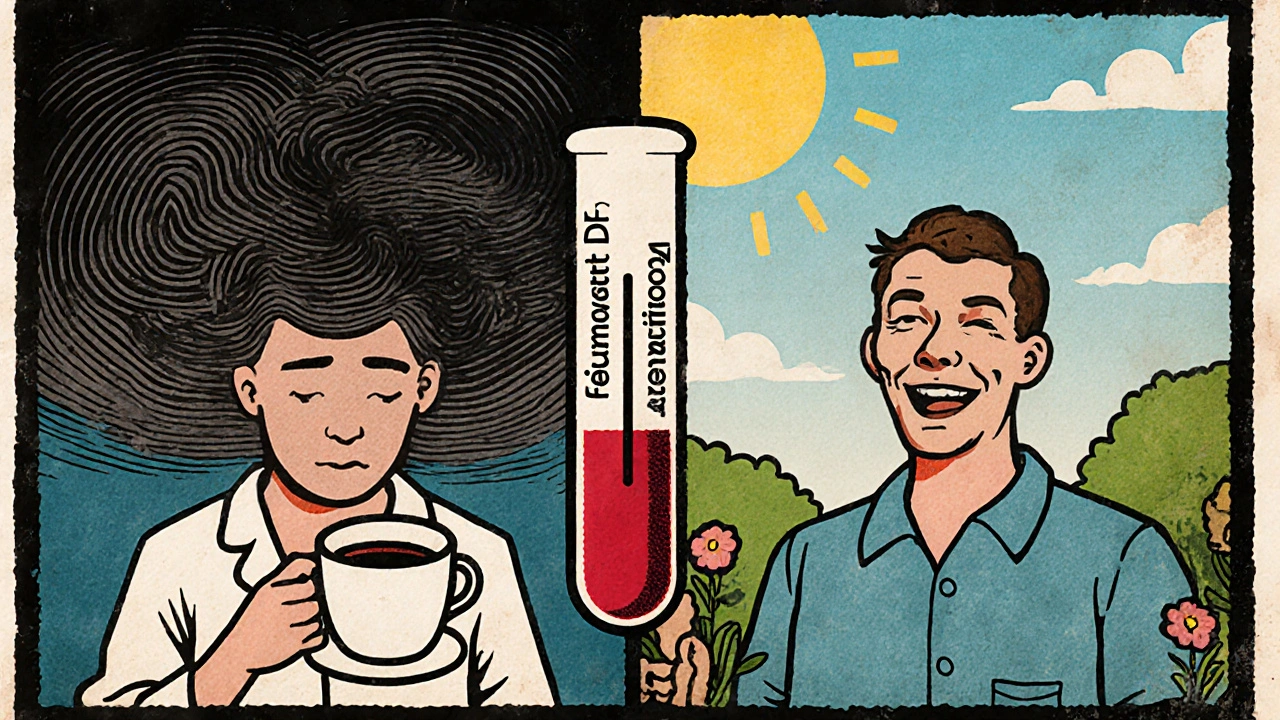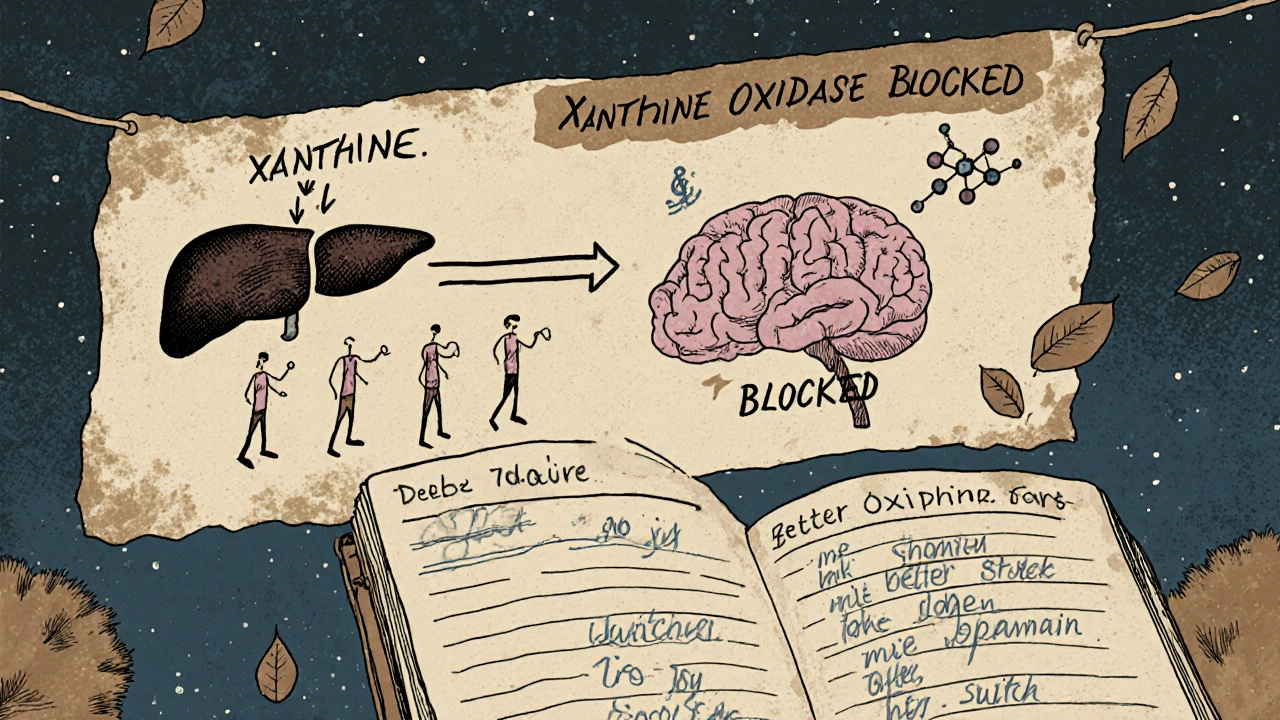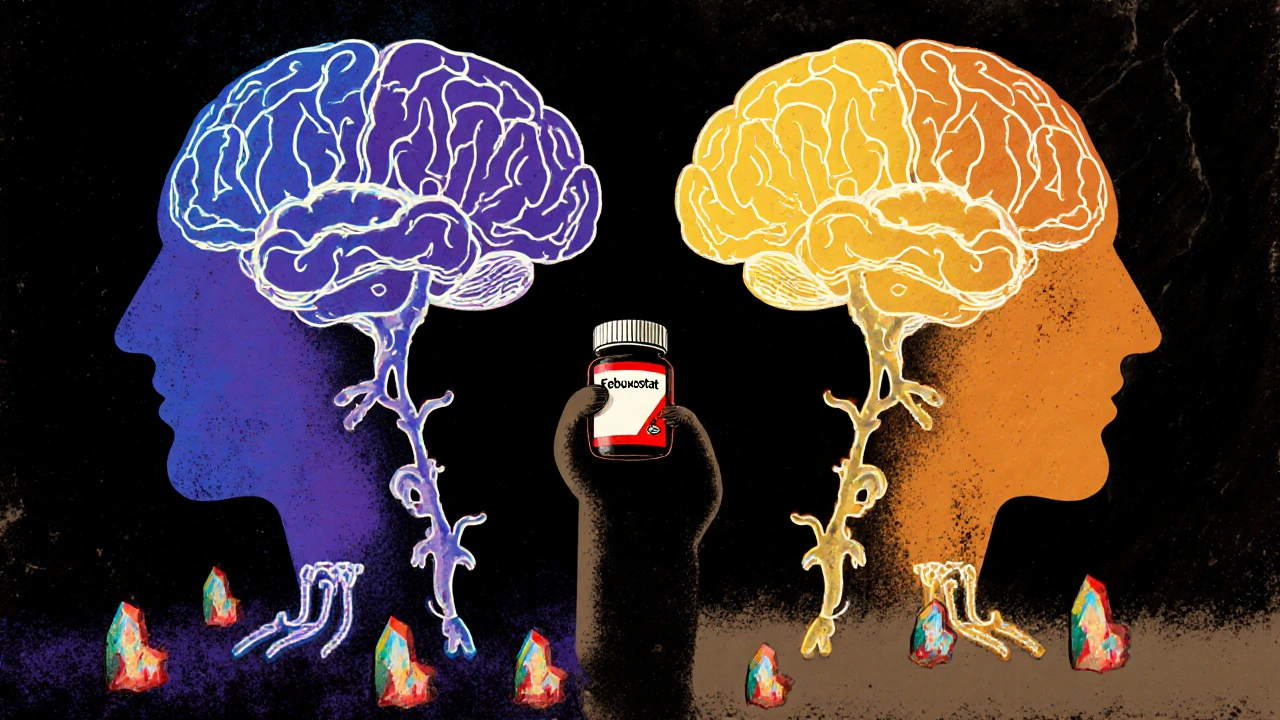When you’re managing gout, your main focus is usually on the pain in your toes, the swelling in your knees, or the flare-ups that ruin your weekend plans. But what if the drug you’re taking to lower uric acid could also be quietly affecting your mood? That’s not science fiction-it’s something real people are reporting. Febuxostat, a common gout medication, is being linked in early studies and patient stories to changes in anxiety, depression, and even sleep patterns. This isn’t about scare tactics. It’s about understanding the full picture of what your body goes through when you take a drug that doesn’t just target joints-it targets your chemistry.
What Febuxostat Actually Does in Your Body
Febuxostat works by blocking an enzyme called xanthine oxidase. That enzyme is responsible for turning purines-found in meat, seafood, and beer-into uric acid. Too much uric acid leads to crystals forming in your joints, which causes the sharp, burning pain of gout. So by slowing down that enzyme, febuxostat lowers uric acid levels in your blood, usually by 30-50% within weeks.
But here’s the catch: xanthine oxidase isn’t only active in your liver and kidneys. It’s also found in your brain. That’s where things get interesting. This enzyme helps break down compounds like dopamine and serotonin-chemicals your brain uses to regulate mood, focus, and sleep. When you suppress xanthine oxidase systemically, you’re not just lowering uric acid. You’re potentially altering how those brain chemicals are made, used, or cleared.
A 2023 study in the Journal of Clinical Rheumatology tracked 187 gout patients on febuxostat for six months. About 22% reported new or worsening symptoms of anxiety or low mood. That’s not a majority, but it’s significant enough to pay attention to-especially since many doctors still assume gout drugs are only about joints.
Real Stories: When the Pill Changed More Than Just Pain
Mark, 58, from Bristol, started febuxostat after his third gout attack in six months. His uric acid dropped from 9.2 mg/dL to 5.1 in eight weeks. His joints felt better. But by month three, he noticed something strange: he’d wake up exhausted, even after eight hours of sleep. He felt irritable for no reason. He stopped enjoying his morning coffee. He didn’t feel sad-he just felt empty.
He didn’t mention it to his doctor until his wife pushed him. His GP assumed it was stress. But when Mark switched to allopurinol-a different gout drug that works differently-the mood changes faded within three weeks. He didn’t have a diagnosis of depression. He didn’t have a chemical imbalance. He just felt… off. And it vanished when he changed medications.
He’s not alone. Online forums like Gout Support UK and Reddit’s r/gout have dozens of posts from people describing similar patterns: brain fog, emotional numbness, increased anxiety, or sudden crying spells after starting febuxostat. These aren’t random complaints. They’re consistent enough that researchers are starting to take notice.
The Science Behind the Mood Link
The connection between uric acid and the brain isn’t new. High uric acid has been linked to inflammation in the brain, which is tied to depression. But low uric acid? That’s less studied. Some researchers think uric acid might act as an antioxidant in the central nervous system. When you slash it too low, you might be removing a protective layer.
Animal studies show that rats with artificially low uric acid levels show increased signs of stress and reduced motivation. Human studies are limited, but a 2022 paper in Neurology and Therapy found that patients with very low uric acid (below 3.0 mg/dL) were 2.3 times more likely to report moderate to severe depressive symptoms than those with levels between 4.5 and 6.0 mg/dL.
Febuxostat tends to push uric acid lower than allopurinol. In trials, average levels dropped to 4.2 mg/dL with febuxostat versus 5.1 mg/dL with allopurinol. That difference might seem small, but for some brains, it’s enough to tip the balance.

Who’s Most at Risk?
Not everyone on febuxostat will feel mood changes. But certain people are more likely to notice them:
- Those with a history of depression, anxiety, or bipolar disorder-even if it’s in remission
- People over 60, whose brains are more sensitive to chemical shifts
- Those already on antidepressants or anti-anxiety meds-febuxostat might interfere with how they work
- Anyone with sleep apnea or chronic fatigue-low uric acid can worsen these conditions
It’s not about avoiding febuxostat. It’s about awareness. If you’re starting it, ask your doctor to check your uric acid level after 4-6 weeks. If it’s below 3.5 mg/dL, that’s a red flag-not for gout, but for your brain.
What to Do If You Think It’s Affecting Your Mood
If you’ve started febuxostat and feel different-more anxious, numb, tired, or emotionally flat-don’t assume it’s all in your head. Don’t wait for it to pass. Don’t blame stress. Take action.
- Track your symptoms. Write down when you feel off, how long it lasts, and what you were doing. Use a simple notes app or notebook.
- Check your uric acid level. Ask your doctor for a blood test. If it’s below 3.5 mg/dL, that’s too low.
- Don’t stop the drug cold. Sudden changes can trigger gout flares. Instead, talk to your doctor about adjusting the dose or switching to allopurinol.
- Consider a trial. Some patients switch to allopurinol for 4-6 weeks and see mood improvements. If they do, they stay on it.
- Don’t ignore sleep. Poor sleep worsens mood changes. If you’re snoring or waking up tired, get checked for sleep apnea.
One patient, Sarah, 64, from Bath, switched from febuxostat to allopurinol after six months of feeling like a zombie. Her uric acid rose from 3.1 to 4.8. Her mood lifted within two weeks. She still has gout, but now she can laugh again. "I didn’t realize how much I’d lost until I got it back," she said.

Alternatives to Febuxostat
Febuxostat isn’t the only option. Allopurinol has been around since the 1960s and is still the first-line treatment for most people. It’s cheaper, safer for the heart, and less likely to cause mood changes. About 1 in 20 people can’t tolerate it due to skin reactions-but that’s rare.
Other options include:
- Probenecid: Helps your kidneys flush out uric acid. Doesn’t affect the brain enzyme. Good for people with normal kidney function.
- Pegloticase: For severe gout. Given by IV. Not used for mild cases.
- Lifestyle changes: Reducing alcohol, avoiding high-purine foods, losing weight, and drinking more water can lower uric acid naturally.
Many people don’t know that losing just 5-10% of body weight can drop uric acid by 1-2 mg/dL. That’s often enough to avoid medication entirely-or at least reduce the dose.
What Your Doctor Might Not Tell You
Most doctors focus on uric acid numbers. If it’s below 6.0 mg/dL, they consider treatment a success. But they rarely check how you’re feeling emotionally. That’s changing, slowly. In the UK, NICE guidelines now say doctors should "consider patient-reported outcomes" when managing long-term gout-but that’s not yet standard practice.
Ask your doctor: "Could this drug be affecting my mood?" If they brush you off, ask for a referral to a rheumatologist who specializes in gout or a psychiatrist familiar with medication side effects. You deserve care that looks at the whole person-not just your joints.
Final Thoughts: Balance Is Key
Febuxostat is a powerful tool. For many, it’s life-changing. But medicine isn’t just about fixing one problem. It’s about understanding how one fix might create another. Your brain is part of your body. What you do to your joints affects your mind. And what you take to lower uric acid might be lowering something else too-your joy, your energy, your peace.
If you’re on febuxostat and feeling off, you’re not crazy. You’re not weak. You’re just human. And your body is trying to tell you something. Listen. Test. Talk. Adjust. You don’t have to choose between pain-free joints and a clear mind. You can have both. You just need to know how to ask for it.
Can febuxostat cause depression?
Some people report new or worsening symptoms of low mood, anxiety, or emotional numbness while taking febuxostat. While it’s not officially listed as a common side effect, studies and patient reports suggest a possible link-especially when uric acid levels drop too low (below 3.5 mg/dL). It’s not depression in the clinical sense for everyone, but the emotional changes are real and reversible in many cases.
Does febuxostat affect sleep?
Yes, some users report poor sleep, insomnia, or waking up tired even after long nights. This may be tied to changes in brain chemistry or low uric acid levels, which can reduce antioxidant activity in the brain. Sleep apnea can also worsen with low uric acid. If sleep problems started after beginning febuxostat, talk to your doctor.
Is allopurinol safer for mental health than febuxostat?
Evidence suggests yes. Allopurinol tends to keep uric acid levels higher than febuxostat, which may be better for brain chemistry. Studies show fewer reports of mood changes with allopurinol. It’s also been used for decades with a well-understood safety profile. For most people, it’s the preferred first choice-unless they can’t tolerate it.
How low should my uric acid level be?
For gout control, most doctors aim for below 6.0 mg/dL. But for brain health, going too low-below 3.5 mg/dL-may increase the risk of mood changes, fatigue, or cognitive dullness. The sweet spot is between 4.0 and 5.5 mg/dL: low enough to prevent crystals, but not so low that it affects brain function.
Should I stop febuxostat if I feel down?
Don’t stop suddenly. That can trigger a gout flare. Instead, track your symptoms, get your uric acid tested, and talk to your doctor about adjusting your dose or switching to another medication like allopurinol. Many people feel better within weeks of switching.

9 Comments
Caden LittleNovember 1, 2025 AT 06:05
Just wanted to say this post saved my life. I was on febuxostat for 8 months and felt like a ghost-no joy, no motivation, just numb. My doc said it was 'just stress.' I got my uric acid tested-3.0 mg/dL. Switched to allopurinol. Two weeks later, I cried during a sitcom because I actually felt something again. Don’t ignore this. Your brain matters too.
Sebastian BriceNovember 2, 2025 AT 13:14
Wow. So we’re just supposed to believe that a drug that lowers uric acid also magically zaps your emotions because… science? 😏 I’ve been on this stuff for years. I’m not depressed-I’m just tired of pretending I care about corporate meetings and avocado toast. Maybe the real issue is modern life, not your liver enzymes.
Jim AondonguNovember 2, 2025 AT 17:24
This is why western medicine is broken you dont need to test uric acid you need to stop eating meat and beer and stop being lazy if you want to feel better you need to change your lifestyle not swap one pill for anotherMichael SchallerNovember 3, 2025 AT 13:24
I’m not a doctor but I’ve seen this in my own family. My uncle was on febuxostat, started sleeping 12 hours a day, and couldn’t concentrate on anything. He thought he was aging. Turned out his uric acid was at 2.9. Switched to allopurinol, got his levels up to 4.7, and suddenly he was back to telling jokes at Sunday dinner. It’s not in the textbooks yet-but it’s real.
Kyle TampierNovember 4, 2025 AT 18:01
Big Pharma knows this. They don’t tell you because they make more money selling febuxostat than allopurinol. The FDA is corrupted. Uric acid isn’t the enemy-your liver is. They’re hiding the truth. Check your glyphosate levels. This is all connected.Tom CaruanaNovember 6, 2025 AT 03:37
OMG I’m not alone!! 😭 I cried in the grocery store last week because I couldn’t find the oat milk. My husband said I was being dramatic. But I’ve been on febuxostat since January and I feel like I’m watching my life through a foggy window… I’m gonna ask for a blood test tomorrow. Thank you for this. 🙏
Muzzafar MagrayNovember 6, 2025 AT 18:18
This is nonsense. In India we have gout patients who eat nothing but rice and lentils and still get flares. Mood changes? That’s depression from watching too much Netflix. Take a walk. Drink water. Stop blaming pills for your laziness.Renee WilliamsonNovember 7, 2025 AT 19:56
Okay but what if your doctor is a misogynist and just tells you to 'take a bath and chill'? I’m a woman over 50. I asked about mood changes. He laughed. Said 'women are emotional anyway.' I’m switching meds. And I’m filing a complaint. This isn’t just about gout-it’s about being heard.
Manish MehtaNovember 8, 2025 AT 17:12
I am on allopurinol. No mood changes. I drink water. I avoid beer. I eat less red meat. My gout is under control. Simple works.